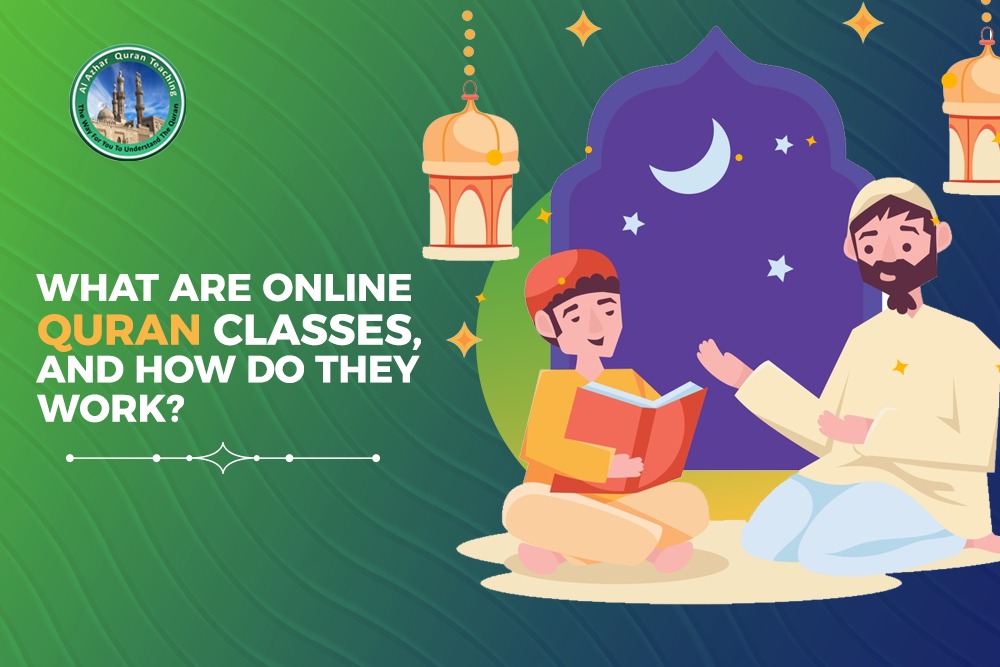In a world that is becoming increasingly digital, even religious education is joining the online revolution. Online Quran classes are gaining popularity as a convenient and flexible way for individuals to learn and deepen their understanding of the Quran. These classes leverage virtual lessons, interactive discussions, and assessments to connect students with qualified Quran tutors from anywhere in the world. Let’s explore the nature and functioning of online Quran classes.
How Online Quran Classes Work:
Quran classes are online lessons covering Islamic studies, Quran, Seerah, and Arabic teachings. Accessible from anywhere with an internet connection, students can learn from the comfort of their own homes. Qualified teachers, often native Arabic speakers or proficient in the language, work remotely with online students, following a structured curriculum.
Students typically log in to a Learning Management System (LMS) where they can access the syllabus, interact with instructors and classmates, and contact support services. Quran classes for kids are also available online, catering to different age groups. Students can choose to study privately or in a group setting, depending on their learning preferences.
Do Students Need to Attend Classes at a Set Time?
Students may need to attend classes at specific times for the following reasons:
- Flexibility in Online Learning: The flexibility offered by online learning is a major benefit. Students can attend classes at their convenience, making it especially helpful for those with work or family obligations.
- Self-Paced Learning: Attending classes at a specific time may not be feasible for all students. Online platforms offer self-paced learning, allowing students to progress at their own speed, review previous lessons, spend more time on challenging topics, and move forward when ready.
- Accessibility to Course Materials: Online learning platforms provide access to course materials like textbooks, lectures, and resources. Students can study and review content at any time, enhancing the learning experience through flexibility.
- Live Interactions and Feedback: While not necessary for all subjects, certain courses, such as Quran recitation and memorization, involve live interactions with tutors. Attending live sessions allows students to imitate and replicate the instructor’s recitation, receiving immediate feedback on their progress.
- Combination of Asynchronous and Synchronous Learning: Online courses often offer a blend of asynchronous and synchronous learning. Students may choose to attend live sessions or access recorded sessions later, providing flexibility in learning styles and schedules.
While attending classes at a specific time may not be necessary for all subjects, it can be beneficial in cases that require immediate engagement and feedback. However, online learning platforms offer flexibility and accessibility to course materials, allowing students to learn at their own pace.
What is Taught in Quran Classes?
In Quran lessons, students study the following:
- Quran Reading: Fundamental aspects include learning how to read the Quran correctly, covering the Arabic alphabet, pronunciation, and articulation of each letter.
- Quran Recitation: Classes focus on reciting the Quran fluently, teaching correct intonation, rhythm, and melody to recite verses with proper Tajweed for clarity and understanding.
- Quran Tajweed: In-depth lessons on Tajweed ensure correct application of rules governing pronunciation and recitation, including vowel sounds, letters with elongations, and rules of stopping and starting.
- Quran Memorizing: Opportunities to memorize the Quran involve techniques such as repetition, recitation, and recollection exercises, considered a highly rewarding and spiritual practice.
- Ijazah: Some classes offer Ijazah certification, formally authorizing individuals to teach the Quran, provided they demonstrate proficiency in recitation, Tajweed, and memorization.
- Arabic Language Basics: Understanding Arabic is crucial for comprehending the Quran. Classes cover Arabic grammar, vocabulary, syntax, basic conversation skills, verb conjugations, and sentence structures.
- Quran Tafsir: Lessons on Tafsir cover the interpretation and explanation of Quranic verses, exploring historical context, linguistic analysis, and deeper meanings for a comprehensive understanding.
- Islamic Studies: Beyond Quranic studies, additional lessons on Islamic studies include learning about Prophet Muhammad’s life, principles of Islam, pillars of faith, and Islamic jurisprudence, offering a holistic approach to understanding Islam and its teachings.
In conclusion, attending Quran classes not only provides individuals with the opportunity to develop their Quranic knowledge and recitation skills but also fosters a deeper understanding and connection with Islam. It enables students to explore the beauty and wisdom of the Quran in a guided and supportive environment.

